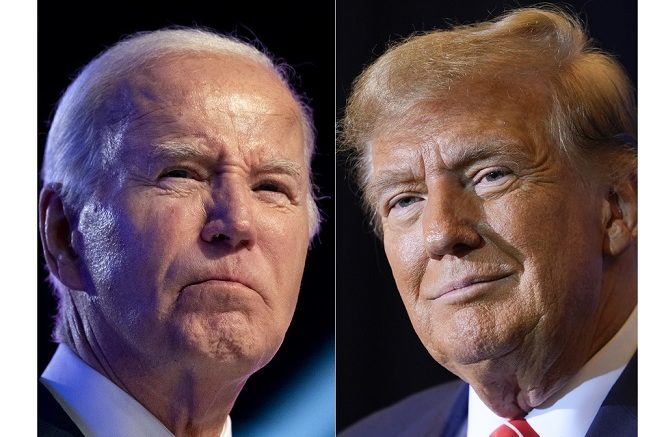WASHINGTON (AP) — President Joe Biden and his predecessor, Donald Trump, romped through more than a dozen states on Super Tuesday, all but cementing a November rematch and pushing the former president’s last major rival, Nikki Haley, out of the Republican race.
Their victories from coast to coast, including the delegate-rich states of California and Texas, left little doubt about the trajectory of the race. Haley won Vermont, denying Trump a full sweep, but the former president carried other states that might have been favorable to her such as Virginia, Massachusetts and Maine, which have large swaths of moderate voters like those who have backed her in previous primaries.
Hours after the last polls closed in Alaska, Haley scheduled a 10 a.m. ET speech in her home state of South Carolina to announce she was suspending her campaign. Three people with direct knowledge who spoke on the condition of anonymity because they weren’t authorized to speak publicly confirmed Haley’s decision ahead of her announcement.
The only contest Biden lost Tuesday was the Democratic caucus in American Samoa, a tiny U.S. territory in the South Pacific Ocean. Biden was defeated by previously unknown candidate Jason Palmer, 51 votes to 40.
Not enough states will have voted until later this month for Trump or Biden to formally become their parties’ presumptive nominees. But the primary’s biggest day made their rematch a near-certainty. Both the 81-year-old Biden and the 77-year-old Trump continue to dominate their parties despite facing questions about age and neither having broad popularity across the general electorate.
Haley watched the election results in private. Her campaign said in a statement that the results reflected there were many Republicans “who are expressing deep concerns about Donald Trump.”
“Unity is not achieved by simply claiming ‘we’re united,’” spokesperson Olivia Perez-Cubas said.
Trump’s Mar-a-Lago estate, meanwhile, was packed for a victory party. Among those attending were staff and supporters, including the rapper Forgiato Blow and former North Carolina Rep. Madison Cawthorn. The crowd erupted as Fox News, playing on screens around the ballroom, announced that the former president had won North Carolina’s GOP primary.
“They call it Super Tuesday for a reason,” Trump told a raucous crowd. He went on to attack Biden over the U.S.-Mexico border and the U.S. withdrawal from Afghanistan. After beginning the night with victories in Virginia and North Carolina, he wrapped Super Tuesday by winning contests in Alaska and Utah.
Biden didn’t give a speech but instead issued a statement warning that Tuesday’s results had left Americans with a clear choice and touting his own accomplishments after beating Trump.
“If Donald Trump returns to the White House, all of this progress is at risk,” Biden said. “He is driven by grievance and grift, focused on his own revenge and retribution, not the American people.”
While much of the focus was on the presidential race, there were also important down-ballot contests. The governor’s race took shape in North Carolina, where Republican Lt. Gov. Mark Robinson and Democratic Attorney General Josh Stein will face off in a state that both parties are fiercely contesting ahead of November.
In California, Democratic Rep. Adam Schiff and Republican Steve Garvey, a former Los Angeles Dodgers baseball player, advanced to the general election race to fill the Senate seat long held by Dianne Feinstein.
Despite Biden’s and Trump’s domination of their parties, polls make it clear that the broader electorate does not want this year’s general election to be identical to the 2020 race. A new AP-NORC Center for Public Affairs Research poll finds a majority of Americans don’t think either Biden or Trump has the necessary mental acuity for the job.
“Both of them failed, in my opinion, to unify this country,” said Brian Hadley, 66, of Raleigh, North Carolina.
The final days before Tuesday demonstrated the unique nature of this year’s campaign. Rather than barnstorming the states holding primaries, Biden and Trump held rival events last week along the U.S.-Mexico border, each seeking to gain an advantage in the increasingly fraught immigration debate.
After the Supreme Court ruled 9-0 on Monday to restore Trump to primary ballots following attempts to ban him for his role in helping spark the Capitol riot, Trump pointed to the 91 criminal counts against him to accuse Biden of weaponizing the courts.
“Fight your fight yourself,” Trump said. “Don’t use prosecutors and judges to go after your opponent.”
Biden delivers the State of the Union address Thursday, then will campaign in the key swing states of Pennsylvania and Georgia.
The president faces low approval ratings and polls suggesting that many Americans, even a majority of Democrats, don’t want to see the 81-year-old running again. His easy Michigan primary win last week was spoiled slightly by an “uncommitted” campaign organized by activists who disapprove of the president’s handling of Israel’s war in Gaza.
Allies of the “uncommitted” movement pushed similar protest votes elsewhere, such as in Minnesota, which has a significant population of Muslims, including in its Somali American community. At least 45,000 voters in Minnesota selected “uncommitted,” which won 19% with almost all votes counted. That exceeds the 13% of voters who selected “uncommitted” in Michigan.
“Joe Biden has not done enough to earn my vote and not done enough to stop the war, stop the massacre,” said Sarah Alfaham of the Minneapolis suburb of Bloomington.
Biden also is the oldest president ever and Republicans key on any verbal slip he makes. His aides insist that skeptical voters will come around once it is clear that either Trump or Biden will be elected again in November.
Trump is now the same age Biden was during the 2020 campaign, and he has exacerbated questions about his own fitness with recent flubs, such as mistakenly suggesting he was running against Barack Obama, who left the White House in 2017.
“I would love to see the next generation move up and take leadership roles,” said Democrat Susan Steele, 71, who voted Tuesday for Biden in Portland, Maine.
Trump has already vanquished more than a dozen major Republican challengers before Haley, his former U.N. ambassador. She had maintained strong fundraising and notched her first primary victory over the weekend in Washington, D.C., a Democrat-run city with few registered Republicans. Trump scoffed that Haley had been “crowned queen of the swamp.”
“We can do better than two 80-year-old candidates for president,” Haley said at a rally Monday in the Houston suburbs.
Trump’s victories, however dominating, have shown vulnerabilities with influential voter blocs, especially in college towns like Hanover, New Hampshire, home to Dartmouth College, or Ann Arbor, where the University of Michigan is located, as well as areas with high concentrations of independents. That includes Minnesota, a state Trump did not carry in his otherwise overwhelming Super Tuesday performance in 2016.
Seth De Penning, a self-described conservative-leaning independent, voted Tuesday morning in Eden Prairie, Minnesota, for Haley, he said, because the GOP “needs a course correction.” De Penning, 40, called his choice a vote of conscience and said he has never voted for Trump because of concerns about his temperament and character.








































